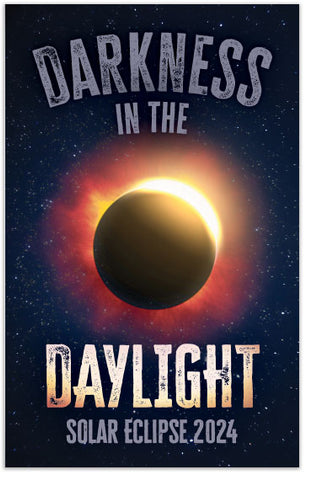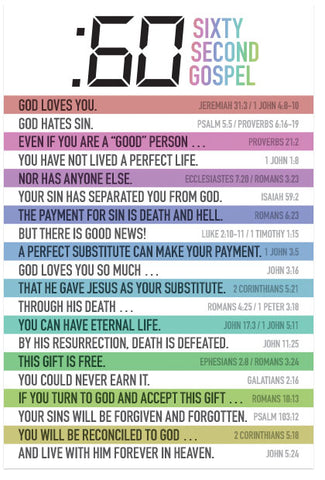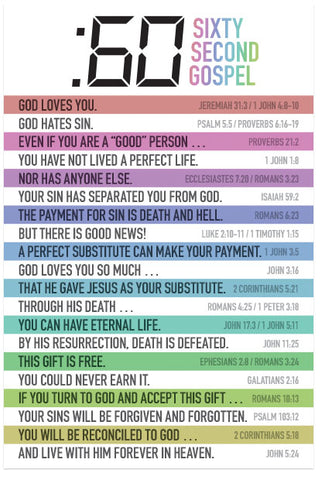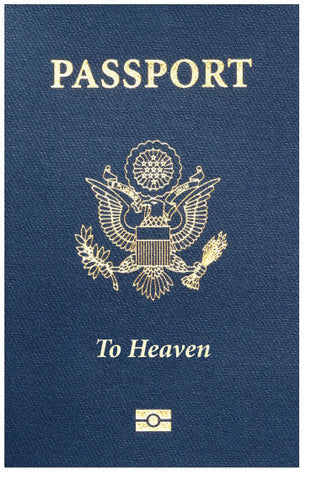The Last Passover Lamb (KJV)
Special-Order Folded Tract
 NOTE: This item is custom-printed to order (click for more details).
NOTE: This item is custom-printed to order (click for more details).
This tract is from our print-on-demand library, and is not kept in stock. Select the options below, and we will custom-print a batch just for you. Because this item is custom-printed, you can add your custom imprint to the back page at no extra cost.
- Estimated shipping date: Thursday, December 4 (Click for more details)
- SKU:
- Discounts: Discount coupons do not apply to this item
- Format: Folded Tract
- Size: 3.5 inches x 5.5 inches
- Pages: 8
- Imprinting: Available with 5 lines of custom text
- Version: KJV
- Returns: Because this item is custom-printed to order, it cannot be returned.
Show all item details
The full text of this tract is shown below in the KJV version. (Do you want to print this tract in a different version than the one listed? Contact us and let us know what you're looking for—we may be able to create the alternate version for you at no charge.)
Do You Believe This?
“Who hath believed our report? and to whom is the arm of the LORD revealed?
For He shall grow up before Him as a tender plant, and as a root out of a dry ground: He hath no form nor comeliness; and when we shall see Him, there is no beauty that we should desire Him.
He is despised and rejected of men; a Man of sorrows, and acquainted with grief: and we hid as it were our faces from Him; He was despised, and we esteemed Him not.
Surely He hath borne our griefs, and carried our sorrows: yet we did esteem Him stricken, smitten of God, and afflicted.
But He was wounded for our transgressions, He was bruised for our iniquities: the chastisement of our peace was upon Him; and with His stripes we are healed.
All we like sheep have gone astray; we have turned every one to his own way; and the LORD hath laid on Him the iniquity of us all.
He was oppressed, and He was afflicted, yet He opened not His mouth: He is brought as a lamb to the slaughter, and as a sheep before her shearers is dumb, so He openeth not His mouth.
He was taken from prison and from judgment: and who shall declare His generation? for He was cut off out of the land of the living: for the transgression of My people was He stricken.
And He made His grave with the wicked, and with the rich in His death; because He had done no violence, neither was any deceit in His mouth.
Yet it pleased the LORD to bruise Him; He hath put Him to grief: when Thou shalt make His soul an offering for sin, He shall see His seed, He shall prolong His days, and the pleasure of the LORD shall prosper in His hand.
He shall see of the travail of His soul, and shall be satisfied: by His knowledge shall My righteous Servant justify many; for He shall bear their iniquities.
Therefore will I divide Him a portion with the great, and He shall divide the spoil with the strong; because He hath poured out His soul unto death: and He was numbered with the transgressors; and He bare the sin of many, and made intercession for the transgressors” (Isaiah 53).
The sinless Messiah was to suffer these things and enter into His glory (Matthew 16:21; 27; Mark 15; Luke 23; 24:26-27; John 19; 1 Corinthians 15:3; Daniel 7:13-14): The Messiah would be undesirable in appearance, be despised and rejected and reproached by men. There would be rejection of His doctrine and, in the end, He would be betrayed into the hands of sinners, unjustly condemned, scourged, mocked, beaten, and put to death (Psalm 22; Isaiah 52:13-15; Daniel 9:24-27). In being rejected by His own, Isaiah the prophet’s saying was fulfilled: “Who has believed our report? And to whom hath the arm of the Lord been revealed?” (Isaiah 53:1; 8:14; Psalm 118:22).
Yet His sufferings would end in His resurrection, ascending to the right hand of God and His immortal honor, because He made atonement for the sin of man, and interceded for sinners with God. “And there was given Him dominion, and glory, and a kingdom, that all people, nations, and languages, should serve Him: His dominion is an everlasting dominion, which shall not pass away, and His kingdom that which shall not be destroyed” (Daniel 7:13-14).
Messiah, glorified, will “make an end of sins,” and “bring in everlasting righteousness” (Daniel 9:24). “Of the increase of His government and peace there shall be no end, upon the throne of David, and upon His kingdom, to order it, and to establish it with judgment and with justice from henceforth even for ever” (Isaiah 9:6-7).
Messiah would be the incarnate Son of God, who was from everlasting: “Thou art My Son; this day have I begotten Thee” (Psalm 2:7); “Kiss the Son, lest He be angry, and ye perish from the way, when His wrath is kindled but a little. Blessed are all they that put their trust in Him” (Psalm 2:12); “Lo, I see four men loose, walking in the midst of the fire, and they have no hurt; and the form of the fourth is like the Son of God” (Daniel 3:25). (Proverbs 30:4; Isaiah 7:14; 9:6; Micah 5:2; Psalm 110:1; Genesis 1:26.)
The sinless Son of God would become the last Passover Lamb, God’s only sacrifice for sin: “He keepeth all His bones: not one of them is broken” (Psalm 34:20). (Psalm 22:14; Exodus 12; Numbers 9:12.)
Fulfillment: John 19:33-36.
“Your lamb shall be without blemish, a male of the first year” (Exodus 12:5-8).
Fulfillment: John 1:29, 36; Hebrews 4:15; 9:28; Revelation 7:14.
“Taken outside the camp” (Leviticus 16:27; 9:11).
Fulfillment: “For the bodies of those beasts, whose blood is brought into the sanctuary by the high priest for sin, are burned without the camp. Wherefore Jesus also, that He might sanctify the people with His own blood, suffered without the gate” (Hebrews 13:11-12).
“Unleavened bread shall be eaten seven days” (Exodus 13:7; 12:15, 19; 34:25).
Fulfillment: “For even Christ our passover is sacrificed for us: Therefore let us keep the feast, not with old leaven, neither with the leaven of malice and wickedness; but with the unleavened bread of sincerity and truth” (1 Corinthians 5:7-8).
The word Passover in Hebrew means “a pretermission, i.e. exemption; skip over (or spare); to hesitate, pass over.” Pretermission means to “disregard intentionally or allow to pass unnoticed or unmentioned; omit.”
“Behold the Lamb of God, which taketh away the sin of the world” (John 1:29): When we repent and believe in faith Christ is God’s sacrifice for our sin, God intentionally exempts us from His wrath to come and His judgment passes over us, sparing us: “And when I see the blood, I will pass over you” (Exodus 12:13, 7).
We are redeemed, not with the traditions or doctrines of men (Matthew 15:6-9; Isaiah 29:13), “But with the precious blood of Christ, as a lamb without blemish and without spot” (1 Peter 1:18-19). “And the blood of Jesus Christ His Son cleanseth us from all sin” (1 John 1:7). “Neither by the blood of goats and calves, but by His own blood He entered in once into the holy place, having obtained eternal redemption for us” (Hebrews 9:12-15). “Thou wast slain, and hast redeemed us to God by Thy blood out of every kindred, and tongue, and people, and nation” (Revelation 5:9). In God’s Son “we have redemption through His blood, even the forgiveness of sins” (Colossians 1:14).
God is the administrator of salvation, not man: “By the which will we are sanctified through the offering of the body of Jesus Christ once for all” (Hebrews 10:10). “But this Man, after He had offered one sacrifice for sins forever, sat down on the right hand of God” (Hebrews 10:12).
“And Abraham said, My son [Isaac], God will provide Himself a lamb for a burnt offering” (Genesis 22:8).
Jesus said, “Your father Abraham rejoiced to see My day: and he saw it, and was glad” (John 8:56).
“Believe in the LORD your God, so shall ye be established; believe His prophets, so shall ye prosper” (2 Chronicles 20:20; Daniel 9:6; Hosea 8:12; Isaiah 42:9).
“Should ye not hear the words which the LORD hath cried by the former prophets” (Zechariah 7:7)?
“The time is fulfilled, and the kingdom of God is at hand: repent ye, and believe the Gospel” (Mark 1:15).
“He that spared not His own Son, but delivered Him up for us all, how shall He not with Him also freely give us all things?” (Romans 8:32). “But as many as received Him, to them gave He power to become the sons of God, even to them that believe on His name” (John 1:12).
—Rebecca Didocha















